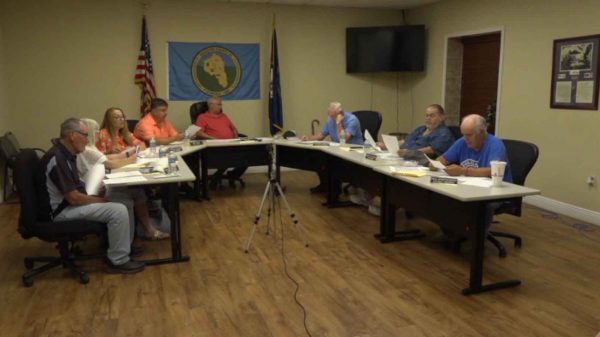From Michael Goins
Kentucky State Auditor’s Office
FRANKFORT, Ky. – State Auditor Mike Harmon today released the audit of the sheriff’s settlement – 2022 taxes for former Magoffin County Sheriff Carson Montgomery. State law requires the auditor to annually audit the accounts of each county sheriff. In compliance with this law, the auditor issues two sheriff’s reports each year: one reporting on the audit of the sheriff’s tax account, and the other reporting on the audit of the fee account used to operate the office.
Auditing standards require the auditor’s letter to communicate whether the former sheriff’s settlement presents fairly the taxes charged, credited and paid in accordance with accounting principles generally accepted in the United States of America. The former sheriff’s settlement is prepared on the regulatory basis, which is described in the auditor’s opinion letter. Regulatory basis reporting for the former sheriff’s settlement is an acceptable reporting methodology, and this reporting methodology is followed for all 120 sheriff settlements in Kentucky.
The former sheriff’s financial statement fairly presents the taxes charged, credited and paid for the period September 1, 2022 through December 31, 2022 in conformity with the regulatory basis of accounting.
As part of the audit process, the auditor must comment on noncompliance with laws, regulations, contracts, and grants. The auditor must also comment on material weaknesses involving the internal control over financial operations and reporting.
The audit contains the following findings:
The former sheriff’s office did not have adequate segregation of duties: This is a repeat finding and was included in the prior year audit report as Finding 2021-001. The former sheriff’s office did not have adequate segregation of duties and internal controls over tax receipts and disbursements. The office manager and deputy clerks collected tax receipts. The office manager or a deputy clerk prepared a daily bank deposit and reconciled the daily receipts to the daily collection report and posted items to the receipts ledger. The office manager prepared the month-end tax reports, prepared checks for tax distribution based on the month-end tax reports and posted checks to the disbursements ledger. The former sheriff and the office manager signed tax distribution checks. The office manager prepared the monthly bank reconciliation, although there is nothing documented to determine who prepared the reconciliation or that it was reviewed by the former sheriff.
The former sheriff did not implement an adequate internal control system to improve segregation of duties.
By not segregating these duties, there was an increased risk of misappropriation of assets either by undetected error or fraud. Internal controls and proper segregation of duties protect employees and the sheriff in the normal course of performing their daily responsibilities.
Good internal controls dictate the same employee should not receive payments, prepare deposits, and post to the receipts ledger. The same employee should not prepare monthly reports, sign checks and post to the disbursements ledger. Also, the same employee should not deposit funds, sign checks, post to ledgers, and prepare bank reconciliations and monthly reports.
We recommend the sheriff’s office implement internal controls and segregate duties as much as possible. Employees receiving payments and preparing deposits should not be posting to the receipts ledger and preparing bank reconciliations. Employees preparing and signing checks should not be posting to the disbursements ledger and preparing bank reconciliations. A proper segregation of duties may not be possible with a limited number of employees, and in that case, the sheriff could take on the responsibility of preparing or reviewing the daily deposits, receipts and disbursements ledgers, monthly reports, and bank reconciliations. These reviews must be documented in a way that indicates what was reviewed, by whom, and when, because signing off on inaccurate information does not provide internal control.
Former Sheriff’s Response: The former official did not provide a response.
The former sheriff did not settle prior year property tax accounts: This is a repeat finding and was included in the prior year audit report as Finding 2021-002. The former Magoffin County Sheriff has not properly settled the 2013, 2014, 2017, and 2018 tax accounts. The former sheriff closed these prior year accounts and paid the remaining balance left in those accounts to the fiscal court. The former sheriff did not follow the procedures provided in detailed schedules per the prior audit reports to properly settle these accounts.
The former sheriff did not follow the guidelines to settle prior year accounts. Furthermore, he closed accounts by paying remaining funds within these accounts to the fiscal court instead of following the recommendations of prior audits to properly settle each account.
As a result, amounts due were not properly remitted to taxing districts. Taxpayers cannot be assured the sheriff’s prior tax accounts were properly settled.
KRS 134.192(1) states, “[e]ach sheriff shall annually settle his or her accounts with the department, the county, and any district for which the sheriff collects taxes on or before September 1 of each year.” In addition, KRS 134.192(7) requires the sheriff to pay to the county treasurer all money that remains in his or her hands.
We recommend the former sheriff consult with the county attorney and the fiscal court to come up with a solution to resolve prior accounts, properly settle those accounts, and resolve any unpaid deficits.
Former Sheriff’s Response: We are working to correct this issue.
The sheriff’s responsibilities include collecting property taxes, providing law enforcement and performing services for the county fiscal court and courts of justice. The sheriff’s office is funded through statutory commissions and fees collected in conjunction with these duties.
The audit report can be found on the auditor’s website.
2016 Tax Account AssetsReceivables Per Draft:Soil24$ Total Assets24 LiabilitiesTotal Unpaid Obligations0 Total Fund Balance as of April 17, 201724$
2014 Tax Account AssetsReceivables Per Draft:State 37$ Extension15 Total Assets52 LiabilitiesTotal Unpaid Obligations0 Total Fund Balance as of May 16, 201552$
2013 Tax Account AssetsReceivables Per Draft:State 71$ Total Assets71 LiabilitiesUnpaid Obligations2,772 Total Fund Balance as of October 15, 2014(2,701)$
The former sheriff did not follow the guidelines to settle prior year accounts. Furthermore, he closed accounts by paying remaining funds within these accounts to the fiscal court instead of following the recommendations of prior audits to properly settle each account.
As a result, amounts due were not properly remitted to taxing districts. Taxpayers cannot be assured the sheriff’s prior tax accounts were properly settled.
KRS 134.192(1) states, “[e]ach sheriff shall annually settle his or her accounts with the department, the county, and any district for which the sheriff collects taxes on or before September 1 of each year.” In addition, KRS 134.192(7) requires the sheriff to pay to the county treasurer all money that remains in his or her hands.
We recommend the former sheriff consult with the county attorney and the fiscal court to come up with a solution to resolve prior accounts, properly settle those accounts, and resolve any unpaid deficits.
Former Sheriff’s Response: We are working to correct this issue.
The sheriff’s responsibilities include collecting property taxes, providing law enforcement and performing services for the county fiscal court and courts of justice. The sheriff’s office is funded through statutory commissions and fees collected in conjunction with these duties.
The audit report can be found on the auditor’s website.
###




















